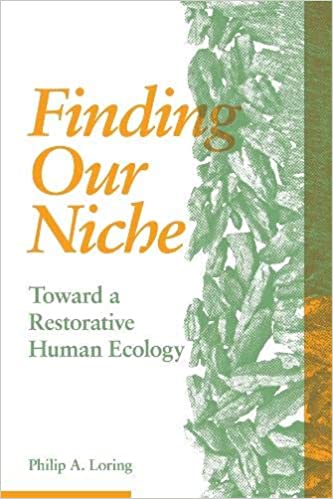By Philip A. Loring
 |
Pages: 192 ISBN: 9781773632872 Publisher: Fernwood Publishing Date Reviewed: April 5, 2021 Release Date: December 15, 2020
Available at:
|
Finding Our Niche is a combination of environmental history and the author's unique philosophy. The book is designed to make readers think about how they interact with nature. Some people may feel disquieted by Loring's ideas, but this is not the book's intent. Instead, the anthropologist turned writer wants people that identify as being of European descent to look at their relationship with nature compared to that of indigenous peoples.
"That so many of us feel inherently separated from the world around us is problematic. In fact, it is one of the biggest barriers that modern society faces to realizing a sustainable future. To be clear, when I say "our" and "we," I am speaking broadly of people of European descent who identify as members of modern, Western civilization."
Loring writes about his childhood in Maine on Turtle Island. He recounts learning about the native tribes that used to live on the land before his ancestors took over. The school lessons primarily consisted of learning the names of the tribes without any additional information. It makes it difficult for students to understand the impact early settlers had on the land.
The author uses his recollections from childhood to build his argument for reconciliation and reintegration. Those of European descent must come to terms with the historical truth that their ancestors were invaders. For some with white supremacist views, it is a difficult fact to reconcile. However, Loring argues it is the first step towards reintegrating with nature.
Finding Our Niche is a history book that takes a different look at the past. Instead of focusing solely on the different cultures and their customs around the world, the author looks at how indigenous peoples work in concert with nature. It is a mutually beneficial relationship, unlike the one Western civilizations have developed. Unlike the native peoples, westerners work against nature.
Readers will find plenty of examples throughout the book on how working with nature is important. By working with the indigenous peoples in British Columbia, the ecologically fragile shoreline is beginning to thrive. Its home to ancient clam beds that sustain both people and wildlife. The book also shows how humans can return to the natural world with an example in Burren that has one of Ireland's most fragile ecosystems. Cattle ranchers toured the area to see firsthand the damage grazing cattle can do to the landscape.
Finding Our Niche is meant to be a thought-provoking book with ideas that will make some readers uncomfortable. Philip A. Loring wants readers to take a look at themselves and think about how they view and interact with nature. He believes it's only by accepting our history will members of Western Civilization begin to have a positive relationship with the environment.

"That so many of us feel inherently separated from the world around us is problematic. In fact, it is one of the biggest barriers that modern society faces to realizing a sustainable future. To be clear, when I say "our" and "we," I am speaking broadly of people of European descent who identify as members of modern, Western civilization."
About the Author - Philip Loring


Philip A. Loring is an anthropologist and ecologist who holds the Arrell Chair in Food, Policy, and Society at the University of Guelph. Loring has researched issues facing community food systems and sustainability in locales all around the world, from Alaska to Thailand. He is particularly interested in win-win scenarios, where people and nature thrive together. An avid storyteller and science communicator, he has produced multiple short films and is a regular contributor to CBC Radio Syndication. Originally from Maine, he lives with his family in Guelph, Ontario.
Find other great books to read! View our most recent recommendations to add to your bookshelf!
READ IT